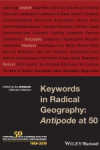Nate Gabriel
Degrees
Honors and Awards
Research Interests
Urban political ecology, environmental governance, archives, visuality and the production of urban space
Urban political ecology, environmental governance, archives, visuality and the production of urban space
| Community Economy This short essay is one of 50 keyword essays published online by the Antipode Foundation to celebrate 50 years of the radical geography journal, Antipode. The essay overviews the idea of community + economy, and outlines various ways that community economies might be further activated. The Community Economy essay can be downloaded here. The full e-book of 50 keywords can be downloaded here.

|
| Paradox and Possibility: Voluntarism and the Urban Environment in a Post-Political Era In this paper, I consider the role of public engagement in the management of urban environments and its ability to undermine post-political discourses. In particular, I explore the ways in which the ethical propositions of an apoliticized environment are variously taken up uncritically, challenged, and sometimes modified through the public’s engagement with de-politicized discourses of environment management. Drawing from a case study in Philadelphia involving ecological restoration volunteers, I argue that volunteerism provides opportunities for the marginalization of the public, but also for confrontation and modification of expert knowledge. Volunteers contest the conceptual underpinnings and desired outcomes of environmental management even as they discipline themselves according to its goals. |
| No Place for Wilderness: Urban Parks and the Assembling of Neoliberal Urban Environmental Governance In this paper, I examine the ways in which urban parks are enrolled in political struggles to reorient the techniques of urban governance toward entrepreneurialism as the only viable model for economic development. Through a case study of Philadelphia’s Fairmount Park System, I examine a series of events during the previous three decades in which Fairmount Park has become subject to this reorientation toward entrepreneurialism. Specifically, I examine how parks, no longer treated as spaces of “nature”, have been reframed as self-supporting constituents of a business-minded urbanism, promotional tools for the attraction of new labor to the city, and a reinforcement of the notion of entrepreneurialism as the inevitable urban development strategy for the 21st century. Yet, I also argue that these transformations are always in a process of negotiation. Even as parks become subject to these dominating discourses, new park construction is a site in which the conceptual assumptions that underpin neoliberal urban policy aren’t frictionlessly transferred from one instance to another but, even when successful, require significant work to overcome competing visions of urban nature. |
| Urban Political Ecology: Environmental Imaginary, Governance, and the Non-Human Literature review of Urban Political Ecology. Focuses on the need for more work on environmental imaginary, governance, and the non-human. |
| Mapping Urban Space: The Production, Division, and Reconfiguration of Natures and Economies This article engages with the notion of the city as capitalist space, focusing on the specific actors that come together to realign economically heterogeneous spaces into the monolithic, capitalist city. |
| The Work that Parks Do: Towards and Urban Environmentality This article discusses the role of visual representation in the production of urban economic subjects. It focuses on Philadelphia in the 19th Century and includes a discussion of the continuation of subsistence practices into the 20th Century. |